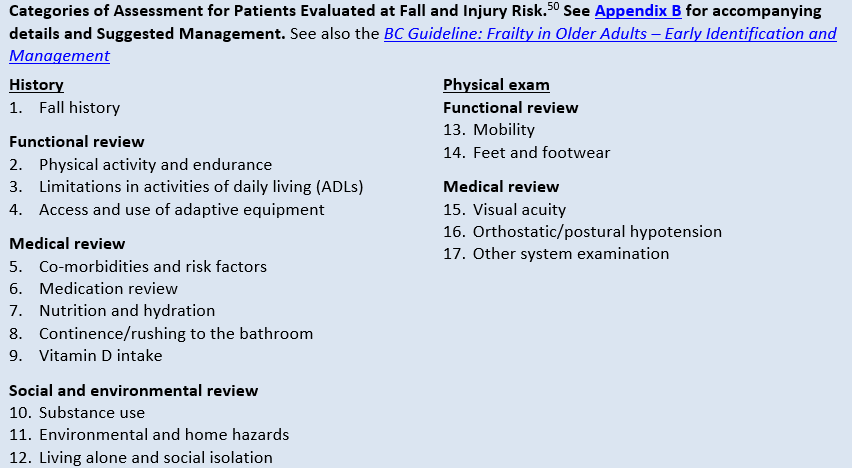Dementia Fall Risk Things To Know Before You Get This
Dementia Fall Risk Things To Know Before You Get This
Blog Article
The 8-Second Trick For Dementia Fall Risk
Table of ContentsDementia Fall Risk Fundamentals ExplainedThings about Dementia Fall RiskIndicators on Dementia Fall Risk You Need To KnowThe Main Principles Of Dementia Fall Risk How Dementia Fall Risk can Save You Time, Stress, and Money.
Assessing loss risk assists the whole healthcare team develop a more secure environment for each client. Ensure that there is an assigned area in your clinical charting system where team can document/reference ratings and document appropriate notes related to fall avoidance. The Johns Hopkins Fall Risk Assessment Tool is among many devices your staff can use to help avoid damaging medical events.Person falls in healthcare facilities prevail and devastating damaging events that continue regardless of years of initiative to minimize them. Improving communication across the analyzing nurse, treatment team, patient, and individual's most included loved ones might enhance fall avoidance initiatives. A group at Brigham and Women's Medical facility in Boston, Massachusetts, looked for to develop a standard loss avoidance program that centered around improved interaction and person and family members interaction.

The innovation team stressed that successful application depends on person and team buy-in, combination of the program right into existing operations, and fidelity to program procedures. The group noted that they are facing exactly how to ensure connection in program implementation during durations of dilemma. During the COVID-19 pandemic, for instance, a rise in inpatient falls was connected with restrictions in person involvement in addition to restrictions on visitation.
Some Known Questions About Dementia Fall Risk.
These incidents are typically considered preventable. To apply the intervention, organizations need the following: Access to Loss ideas resources Loss pointers training and re-training for nursing and non-nursing staff, consisting of new nurses Nursing process that enable client and household engagement to perform the falls assessment, make sure usage of the prevention plan, and perform patient-level audits.
The results can be highly damaging, commonly increasing client decrease and causing longer health center remains. One research approximated stays increased an added 12 in-patient days after a client autumn. The Fall TIPS Program is based on interesting patients and their family/loved ones throughout three main procedures: analysis, personalized preventative interventions, and auditing to make sure that patients are participated in the three-step fall avoidance procedure.
The client evaluation is based upon the Morse Fall Range, which is a validated fall threat assessment device for in-patient hospital settings. The range includes the 6 most common reasons individuals in medical facilities fall: the client autumn history, high-risk problems (including polypharmacy), usage of IVs and various other external tools, psychological status, gait, and mobility.
Each threat factor web links with one or even more workable evidence-based interventions. The registered nurse produces a strategy that integrates the interventions and is visible to the care group, client, and family members on a laminated poster or printed aesthetic aid. Registered nurses develop the strategy while satisfying with the client and the individual's household.
The Only Guide for Dementia Fall Risk
The poster functions as an interaction tool with other members of the individual's treatment team. Dementia Fall Risk. The audit element of the program includes analyzing the client's understanding of their threat variables and avoidance plan at the device and medical facility degrees. Registered nurse champions perform at the very least five individual meetings a month with clients and their families to look for understanding of the fall avoidance plan

A projected 30% of these drops result in injuries, which can range in extent. Unlike various other more tips here negative events that require a standard scientific response, fall avoidance depends very on the needs of the patient.
Some Known Details About Dementia Fall Risk

Based on auditing outcomes, one site had 86% try here conformity and 2 websites had over 95% compliance. A cost-benefit analysis of the Loss ideas program in eight hospitals approximated that the program expense $0.88 per person to execute and caused financial savings of $8,500 per 1000 patient-days in direct expenses associated to the prevention of 567 tips over three years and eight months.
According to the technology team, organizations curious about carrying out the program should carry out a readiness evaluation and drops avoidance gaps evaluation. 8 In addition, organizations need to guarantee the essential facilities and operations for implementation and establish an application strategy. If one exists, the organization's Fall Avoidance Job Force must be involved in preparation.
Some Known Questions About Dementia Fall Risk.
To begin, organizations need to make certain conclusion of training modules by nurses and nursing assistants - Dementia Fall Risk. Hospital team should evaluate, based on the requirements of a health center, whether to make use of an electronic health record printout or paper version of the autumn avoidance strategy. Applying groups ought to hire and train nurse champs and develop procedures for bookkeeping and coverage on loss information
Team require to be associated with the procedure of upgrading the operations to engage individuals and family members in the analysis and avoidance strategy process. Solution ought to remain in location to make sure that devices can understand why a loss took place and remediate the reason. A lot more especially, registered nurses ought to have channels to provide recurring comments to both team and system leadership so they can adjust and improve fall prevention workflows and communicate systemic troubles.
Report this page